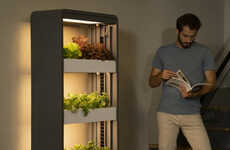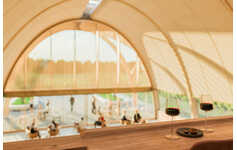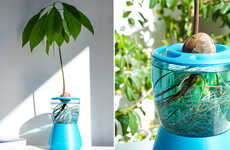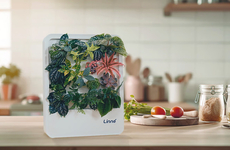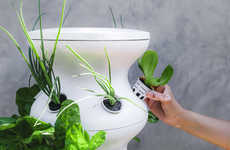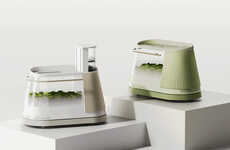
Carly Dean and Peter Gudonis' Wine Garden is Sustainable Drinking Solution
Brandon Bastaldo — April 23, 2013 — Eco
References: urbangardensweb
As more architects are trying to build eco-friendly structures that support environmental causes, it's great to see design students like Peter Gudonis and Carly Dean who are already involving aspects of urban agriculture in their school place with creations like the hydroponic wine garden.
Both students at Cornell University, Carly Dean and Peter Gudonis are the recipients of the Cornell Council of the Arts Grant. Working with Nicholas Cassab-Gheta, this hydroponic wine garden in the result of these green minded students' exploring their interests in sustainable architecture, growing facades and productive technologies.
As a result of their experimentation, the hydroponic wine garden is both a pretty bar fixture and a structure that transmits an important message about how aspects of building design can be a solution to many of the environmental crises our planet faces today.
Both students at Cornell University, Carly Dean and Peter Gudonis are the recipients of the Cornell Council of the Arts Grant. Working with Nicholas Cassab-Gheta, this hydroponic wine garden in the result of these green minded students' exploring their interests in sustainable architecture, growing facades and productive technologies.
As a result of their experimentation, the hydroponic wine garden is both a pretty bar fixture and a structure that transmits an important message about how aspects of building design can be a solution to many of the environmental crises our planet faces today.
Trend Themes
1. Hydroponic Agriculture - The use of hydroponic systems in agriculture presents opportunities for sustainable and efficient food production.
2. Green Architecture - Incorporating aspects of urban agriculture in building design can foster sustainability and environmental stewardship.
3. Productive Technologies - Exploring innovative technologies in architecture can lead to the development of structures that serve multiple purposes, such as the hydroponic wine garden.
Industry Implications
1. Food and Beverage - The integration of hydroponic systems in the wine industry can revolutionize wine production and create more sustainable practices.
2. Architectural Design - Designing eco-friendly structures with urban agriculture elements can create disruptive innovations in the field of architecture.
3. Environmental Conservation - The development of productive technologies in building design can contribute to addressing the environmental crises our planet is facing.
6.7
Score
Popularity
Activity
Freshness


